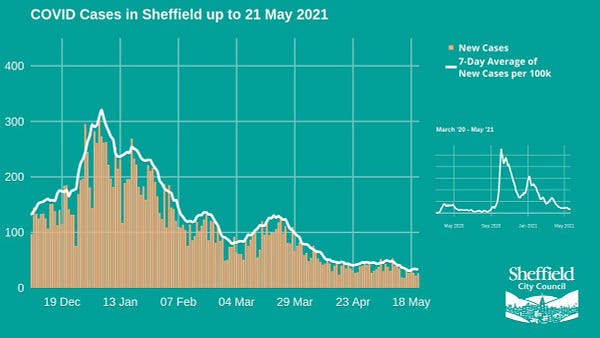Good morning readers — and welcome to this week’s briefing.
Today’s newsletter takes a look at the (very hot) Sheffield housing market. It also has all our usual recommendations, a mini review of a book at least one side of the city will love and a really nice short piece by one of our fantastic trainees about Sheffield’s ‘Girl from Mars’.
We have one favour to ask: If you’re enjoying our newsletters, please tell your friends about The Tribune by forwarding them this email so they can sign up too. Alternatively, click share below to forward the briefing via text or on social media. We’re very grateful for your help in spreading the word so far. There are more than 3,100 of you signed up already.
If someone forwarded you this newsletter, please join The Tribune’s mailing list to get all our journalism in your inbox.
We had a great response to our weekend read about the deep roots of the Sheffield Greens’ recent electoral successes. If you missed that piece, you can find it here.


The big story: House prices through the roof
The top line: Sheffield is in the midst of a property price boom, with prices in the city rocketing in the last few months.
The data: According to the ONS, Sheffield currently has the highest average housing price in South Yorkshire. Houses in the city are also attracting an average of 5.9 offers per sale, making Sheffield the second-most in-demand location in England.
Average house prices in the city have risen by more than 30% from February 2016 to February 2021.
In February 2016, the average house in Sheffield cost £144,773 but just five years later it has increased to £191,303.
The latest: These figures don’t take into account the huge rises that have been seen in the last few months. Property website Zoopla says the average price paid in Sheffield over the last 12 months was £216,034 — 6% or £11,849 up on last year. Some city estate agents are reporting sales taking place at £70,000 or even £100,000 above the initial asking price.

What’s driving it? Estate agents say some of the increase is being driven by people moving to the North from London and the Home Counties. They say lots of buyers are looking for more space after working or schooling from home for over a year. Sheffield’s larger properties are proving a major draw. Nationally, the stamp duty holiday has also made buying much cheaper over the last year.
Investors beware: Some property insiders say the increases are also partly being driven by investors looking to make a ‘quick buck’ in the city’s traditionally cheap housing market. The website Property Investment UK describes Sheffield as a ‘budget property investors paradise’ and ‘one of the cheapest major cities in England to buy a property.’
Bottom line: Many will see the property market as a great sign that Sheffield will be a popular place to live in the post-pandemic world where fewer professionals migrate to London and people prize green space and liveability. Bringing new people and ideas into the city can be a great thing. But local policymakers will want to keep a close eye on the down-stream effects of this boom.
Looking ahead: Here are three areas we will be tracking in the months ahead (if you want to contribute to our reporting, just email editor@sheffieldtribune.co.uk):
The housing list: There are 40,000 people in Sheffield on the waiting list for a council property, with more than a third of these classed as being in ‘desperate need’.
Social building: In 2019 Sheffield Council announced ‘ambitious’ plans to build 3,100 new council houses over the next 10 years — equating to just 310 new social properties in the city per year.
Evictions: The ban on bailiff-enforced rental sector evictions in England ends on 31 May. Housing charity Shelter has predicted a wave of evictions are likely later this year.
This week’s weather
The bank holiday weekend’s weather was a distinct improvement from the rain and cold of the last few weeks. With warm temperatures and sunny conditions forecast for the rest of the week, it looks like summer might have finally arrived. Enjoy!
Covid-19 Update
Cases: The Covid case rate — the number of people per 100,000 population testing positive for the virus in the last week — is still falling in Sheffield. 187 cases were identified in the city in the seven days to May 25, equating to a case rate of 32. The England average has now risen to 25.7.
Hospitals: Just eight people are now in hospital being treated for Covid in Sheffield, the lowest number since the beginning of the pandemic. Two of these patients are still on ventilation, the same number as last week. The last two deaths in the city linked to the virus took place on May 12.
Vaccines: 493,097 vaccine doses have now been administered in Sheffield, including 307,264 first doses and 185,833 second doses. Sheffield City Council says nearly two in every three people in the city have now received their first dose. Over 88% of those aged 65 and above are fully vaccinated.


Book of the week
91 by Alex Miller
91 tells a story of redemption. In May 1990, Sheffield Wednesday were relegated from the First Division, yet just 12 months later had both won promotion back to the top flight and beat Manchester United at Wembley to win the League Cup. Wednesday reporter Miller has spent months speaking to everyone involved in the Owls’ legendary promotion and cup run double, amassing masses of testimony about one of the club’s most fondly-remembered seasons.
The book is the latest from Sheffield-based publisher Vertical Editions, who are busily carving out a niche for themselves in the world of sports publishing. If the idea of reading about Wednesday winning turns your stomach, you can always try one of their Blades-based titles including Paddy Kenny’s autobiography, The Gloves Are Off, and He’s One of Our Own, the inside story of Chris Wilder’s Bramall Lane revolution.
Order 91 here.
Our favourite reads
The sad news that the University of Sheffield has decided to close its archaeology department despite protests from students, staff and activists was covered extensively this week. This Big Issue piece nails just what we stand to lose if the course disappears from the curriculum.
Sheffield’s tree scandal is still making news years after the protests ended. This Yorkshire Post piece by Chris Burn reveals that Sheffield City Council has now asked a law firm to investigate whether legal privilege was misused by officers to stop campaigners accessing information.
Local Democracy Reporter George Torr reveals Sheffield City Region is to change its name to the South Yorkshire Mayoral Combined Authority on July 16. He also reports that the mayor will be providing an important update on how buses are to be run in the county in the next week.
A great piece from Now Then about the long-running saga over the former Rare and Racy bookshop on Devonshire Street. The shop and its neighbours were forced to move in 2017 to make way for new development, but the latest plan was rejected by councillors last week.
The Star’s business editor David Walsh is doing an interesting series on building restorations. This week’s instalment is about Globe Works on Penistone Road, a 200-year-old former cutlery works which has been transformed into a modern workspace.
Hidden history



It takes some doing, but Bramall Lane bridge can be found if you know where to look. The 100-metre long 19th century bridge is located near Decathlon on Eyre Street, and marks the place where the historic road used to cross the Porter Brook.
After being largely obscured by more than 150 years of development, the impressive stone bridge has been ‘re-found’ in recent years and now has an information panel detailing its history. There is also a friends group committed to preserving it.
Things to do
Film: Sheffield’s annual Doc/Fest film and arts festival starts this Friday, June 4. Highlights of the first weekend include a showing of Summer of Soul, a documentary featuring unseen footage of Stevie Wonder and Nina Simone performing at a long-forgotten New York music festival.
Listen: Lawrie Harvey and Nic Allen’s Looking Up Sheffield podcast has now been running for just over 18 months. In that time the well-connected duo have made 12 programmes over two series, looking at both the heritage and here and now of the Steel City. As a new media company in Sheffield, it’s great to see other people thinking creatively about ways to report on and celebrate the city.
Art: Reimagined Places (29 May to 6 June) is an exhibition of work by three artists from the Kelham Island Arts Collective based on their response to being cut off from the world during the coronavirus pandemic. The free exhibition is open 10-7 on weekdays and 11-4 on weekends.
Learn: Now open again is Abbeydale Industrial Hamlet, a beautifully preserved 18th century scythe and steelworks on the banks of the River Sheaf. The museum is accepting visitors again every weekend plus Thursdays and Fridays in the school holidays. Entry is free but pre-booking is essential.
Watch: Gods of Snooker is a brilliant Louis Theroux-produced documentary about the characters involved in the sport’s 1980s golden age. To whet your appetite, Sheffield native Rachel Cooke’s hilarious review in the New Statesman makes it clear this is no ordinary sports documentary.
‘Self-belief and a can-do attitude changed my life’
By Mollie Simpson
In 1989, Helen Sharman was driving home from her job as a food technician at Mars and Wrigley when she heard an advert on the car radio. “Astronaut wanted: no experience necessary,” it said.
Helen didn't think she stood a chance of being chosen. She remembered how her science teacher at Jordanthorpe Comprehensive pointed out she’d be the only girl taking A-Level Physics and Chemistry. But then she also remembered her mum's advice — if you don't try, you'll never know. “Self-belief and a can-do attitude changed my life,” she explains. “People are the biggest limitations in our lives. There's a huge amount we can do, and we should make the best use of our lives.”
Helen was picked out of 13,000 candidates for Project Juno, a collaboration between the Soviet Union and private British companies to work on the Mir Space Station over eight days. On 18th May 1991, she launched into space on the Russian Soyuz aircraft. Her tasks were medical, chemical, and agricultural experiments.
She recalls the strangeness of not being touched by gravity, watching plants slowly growing and spreading their roots all over the place instead of down into the soil. She saw 16 sunrises and 16 sunsets, and remembers the feeling of weightlessness and camaraderie. It was a mission that made Helen the first British person in space, years before Tim Peake would work on the International Space Station. Yet she's often misremembered as the first British woman in space — something she corrects me on immediately.
Thirty years ago, on 26th May 1991, she landed back on earth.
Know someone in Sheffield we should interview in a future newsletter? Hit reply to this email to let us know.
If you enjoyed this newsletter, we’d love you to spread the word about The Tribune by sending it to your friends. Simply forward this email or click the share button below.
If you have a story you would like us to look into, hit reply to this briefing or email editor@sheffieldtribune.co.uk.
We are looking for talented local journalists who believe in our mission and want to write for The Tribune. If that’s you, please email us at the email address above.
If someone forwarded you this newsletter, please join The Tribune’s mailing list to get all our journalism in your inbox.







